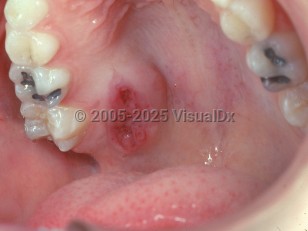Malignant salivary gland tumor - Oral Mucosal Lesion
Alerts and Notices
Important News & Links
Synopsis

Malignant salivary gland tumors represent a heterogeneous group of neoplasms that arise from either major or minor salivary gland tissue. The most common of these tumors include mucoepidermoid carcinoma, polymorphous low-grade adenocarcinoma, adenoid cystic carcinoma, and acinic cell carcinoma. Carcinoma can also evolve from a pre-existing pleomorphic adenoma (benign mixed tumor).
Most salivary gland malignancies are detected in adult patients, although they can affect a wide age range. Most series describe a slight female predilection.
The most common symptom associated with salivary gland malignancies is swelling, although pain is classically an early symptom of adenoid cystic carcinoma. Tenderness may be present.
These lesions are usually rather slow growing, and patients may not be aware of their presence due to slow evolution of the process.
Most salivary gland malignancies are detected in adult patients, although they can affect a wide age range. Most series describe a slight female predilection.
The most common symptom associated with salivary gland malignancies is swelling, although pain is classically an early symptom of adenoid cystic carcinoma. Tenderness may be present.
These lesions are usually rather slow growing, and patients may not be aware of their presence due to slow evolution of the process.
Codes
ICD10CM:
C08.9 – Malignant neoplasm of major salivary gland, unspecified
SNOMEDCT:
255072001 – Malignant tumor of salivary gland
C08.9 – Malignant neoplasm of major salivary gland, unspecified
SNOMEDCT:
255072001 – Malignant tumor of salivary gland
Look For
Subscription Required
Diagnostic Pearls
Subscription Required
Differential Diagnosis & Pitfalls

To perform a comparison, select diagnoses from the classic differential
Subscription Required
Best Tests
Subscription Required
Management Pearls
Subscription Required
Therapy
Subscription Required
References
Subscription Required
Last Updated:03/21/2021
Malignant salivary gland tumor - Oral Mucosal Lesion

